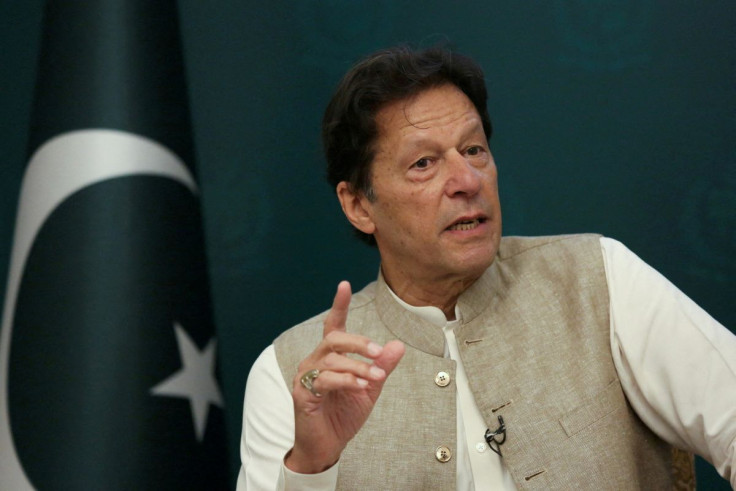Imran Khan Embraces Victimhood To Stay Relevant In Pak Politics

Pakistan Prime Minister Imran Khan cleverly framed the political narrative of the Islamic republic which termed going against him as akin to going against the founding fathers and the constitution hence securing himself a graceful way out of a serious diplomatic and political mess.
By condemning in advance those who will vote against him in the no-trust motion in the National Assembly as willing accomplices in an international conspiracy during his lengthy sermons with nationalist zeal, Khan has stayed relevant to a broad section of the electorate by catering to their emotion and selling them the dream of an independent Pakistan.
The 69-year-old premier of the nuclear-armed country in South Asia pictured himself as a lone fighter for Pakistan's cause, and said he became the whipping boy as he does not want to surrender Pakistan's sovereignty before foreign powers.
According to him, the opponents are traitors and their move to go for a no-trust vote is a sign of sell-out and a compromised corrupt deed.
The embattled prime minister built the image of a lone fighter to get public sympathies to his side as he had decided to dissolve Pakistan's Parliament earlier.
Giant metal containers blocked roads and entrances to the Parliament, diplomatic enclave, and other sensitive installations and had imposed a ban on pillion riding, and suspended the metro bus service ahead of the National Assembly meeting.
Khan was widely expected to lose the no-confidence motion as key allies had parted ways and more than a dozen defectors from his own political party had hinted at voting against the trust vote. Khan came to power in 2018 and was expected to complete his full five-year term in 2023.
"The president of Pakistan, Dr. Arif Alvi, has approved the advice of the prime minister of Pakistan to dissolve the National Assembly under Article 58 (1) of the Constitution of the Islamic Republic of Pakistan," according to a statement by the President's Secretariat.
At the National Assembly, Deputy Speaker Qasim Suri, who was chairing the April 3 session, refused to take up the no-trust motion, terming it a contradiction of Article 5 of the Constitution, which says loyalty to the state is the basic duty of every citizen.
Before initiating a discussion in the house, Information Minister Fawad Chaudhry referred to the no-trust resolution as a threat received from a foreign country and cited the threat letter received from the U.S. through Pakistan's ambassador, seeking Imran's scalp.
Later, the deputy speaker noted that the points raised by the information minister were "valid" and dismissed the no-trust vote.
U.S. President Joe Biden has not called Khan since taking office, and the White House has denied any role in toppling Khan's government. Khan is reported to have placed Pakistan close to China and Russia.
A jubilant Imran said the "billions of rupees" that had been wasted to buy lawmakers' could be donated to orphanages and the poor.
"Prepare for elections. No corrupt forces will decide what the future of the country will be," he added.
Though all the security chiefs attended the meeting of the National Security Council (NSC), the apex body concerned with the country's security, the military has distanced itself from the political developments in the country.
"Army has nothing to do with the political process," Major General Babar Iftikhar, the head of the military's public relations wing, told Reuters.
Angered by the action of the ruling party, the opposition held a mock session in the lower house of parliament and, 195 lawmakers pretended to be voting in favor of the no-confidence motion.
Shehbaz Sharif, leader of the opposition in the National Assembly who was all set to step into Imran's shoes, termed developments as "nothing short of high treason". "Imran Khan has pushed the country into anarchy," he said.
Pakistan People's Party (PPP) co-chairperson Asif Ali Zardari said the ruling by the deputy speaker was "totally illegal" and PPP Chairman Bilawal-Bhutto Zardari said the government violated the constitution by not allowing voting to take place.
Another opposition leader Maryam Nawaz said that no one could be allowed to "distort" the constitution for the sake of saving their seat.
Pakistan Chief Justice Umar Ata Bandial said that all orders of the prime minister and the president regarding the dissolution of the National Assembly will be subject to the court's decision.
In a suo motu hearing on April 3, the Supreme Court has banned all state institutions from initiating any extra-constitutional measures in the wake of the dismissal of the no-confidence vote.
Though Khan's Pakistan Tehreek-e-Insaf has hinted at snap polls within 90 days, the country holds the dubious distinction of placing the nation at the mercy of army generals seven times since its creation in 1948.
Having managed to become the state undo himself, Khan now gives company to King Louis XV of France, who said, "After me, the flood."





